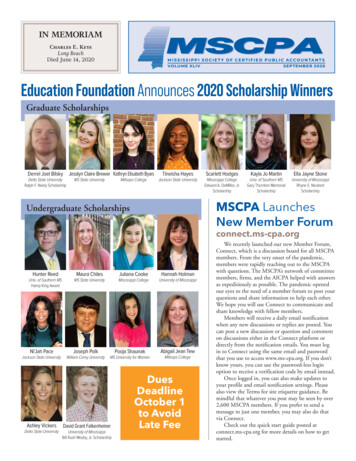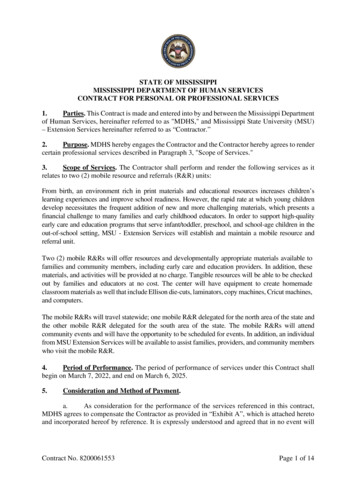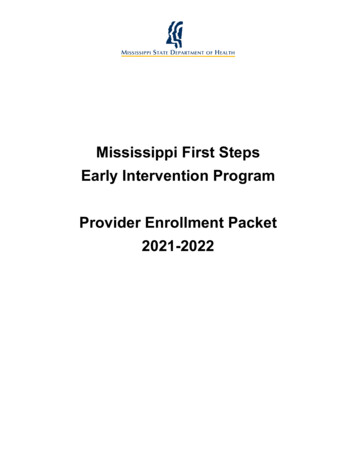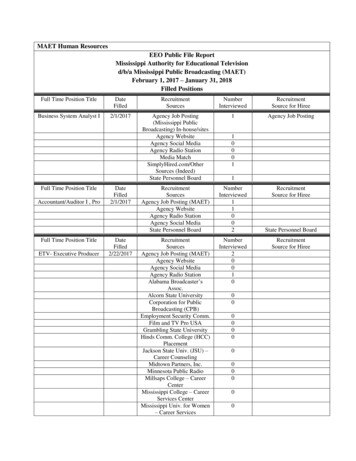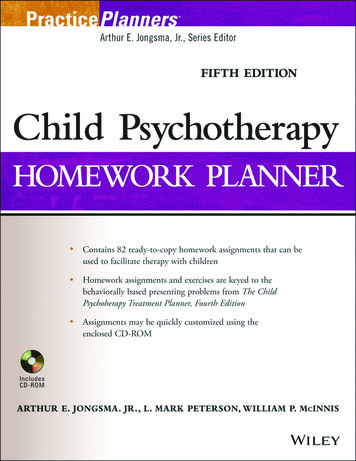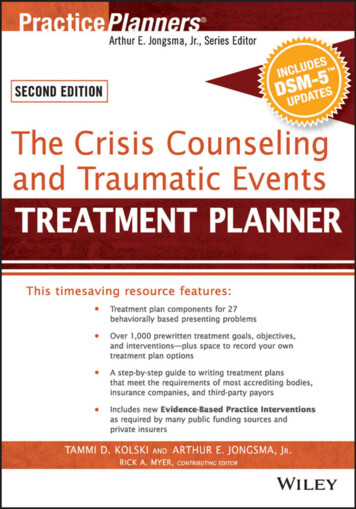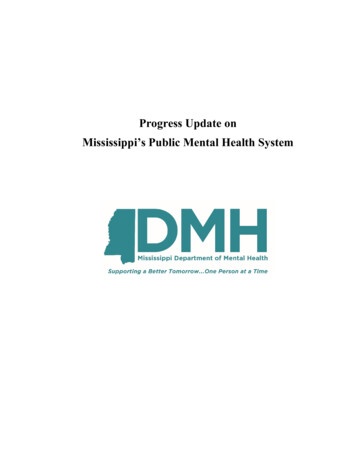
Transcription
Progress Update onMississippi’s Public Mental Health System
SummaryThe Mississippi Department of Mental Health (DMH) certifies, provides and/or financiallysupports a network of services for people with mental illness, intellectual/developmentaldisabilities, substance use problems, and Alzheimer’s disease and/or other dementia. DMHdirectly operates behavioral health programs and IDD programs throughout the State.Mississippi’s public mental health system is comprised of three components: 1) state-operatedprograms, 2) regional community mental health centers, and 3) other nonprofit/profit serviceagencies/organizations. The 14 Community Mental Health Centers operate under the authority ofregional commissions appointed by county boards of supervisors from their respective serviceareas.BackgroundIn 2011, the United States Department of Justice (DOJ) investigated the State of Mississippi’spublic mental health system, issuing a Findings Letter in December 2011 that alleged the State ofMississippi fails to provide services to qualified individuals with disabilities, including mentalillness and intellectual and developmental disabilities, in the most integrated settings appropriateto their needs, in violation of the Americans with Disabilities Act.Since 1997, the United States Department of Justice has been involved with more than two dozenstates in regard to allegations of Olmstead/ADA violations. DOJ’s involvement ranges from filingStatements of Interest in cases to formal investigations and the issuing of Findings Letters toStates with the hope of states entering into multi-year, multi-million-dollar settlement agreements.In 2009, on the tenth anniversary of the Supreme Court’s decision in Olmstead v. L.C., 527 U.S.581 (1999), President Obama launched “The Year of Community Living” and directed federalagencies to vigorously enforce the civil rights of Americans with disabilities. Since then, theDepartment of Justice has made enforcement of Olmstead a top priority.In 2013, Attorney General Jim Hood sent a letter to the Department of Justice outlining severaltasks that the State would accomplish, which postponed any potential lawsuit at that time. Duringthe 2013 Legislative Session, at the request of the Attorney General and DMH, the MississippiLegislature appropriated an additional 10 million to DMH for the purpose of increasing andimproving community services for the State of Mississippi. In 2014, the same 10 million, alongwith an additional 6.1 million was appropriated to DMH to expand community services.Ultimately, the DOJ filed a complaint against the State of Mississippi in 2016, alleging that thestate failed to provide adults with mental illness with community-based mental health services.Progress Update on Mississippi’s Public Mental Health System – November 2019Page 2
The additional funding was again appropriated to DMH during the 2015, 2016, 2017, 2018, and2019 Legislative Sessions. DMH has used the funds to continue the efforts to expand the capacityfor community-based services and reduce the reliance on institutional care.In FY19, DMH shifted an additional 13.3 million from its institutional programs to the ServiceBudget. This shift included 8 million directed towards the expansion of crisis services, includingadditional crisis stabilization beds, court liaisons, crisis counselors, and an additional Program ofAssertive Community Treatment (PACT) Team. Through these funds, additional crisisstabilization beds have opened in Regions 1, 3, 7, 9, and 14, while Region 4 added an additionalPACT Team. These additional funds will help the State move forward with more communityplacement of individuals through expanding services provided by community service providers.Federal Court OrderFollowing a four-week trial in the summer of 2019, United States District Judge Carlton Reevesissued a Memorandum Opinion and Order, writing that the United States proved its case, whilealso acknowledging the complexity of the mental health system and the progress the state made inmoving towards a community-based system of care. The Memorandum Opinion and Order stated:“This case is well‐suited for a special master who can help the parties craft an appropriateremedy—one that encourages the State’s forward progress in a way that expedites and prioritizescommunity‐based care. The evidence at trial showed what the State needs to do. The primaryquestion for the special master is how quickly that can be done in a manner that is practical andsafe for those involved.The parties are therefore ordered to submit, within 30 days, three names of potential specialmasters and a proposal for the special master’s role. A hearing will be held this fall. Theproposals and lists may be separate, but the parties should confer prior to that date to see if theremight be any agreed-upon candidates respected, competent, and neutral enough to do the job.”Progress Update on Mississippi’s Public Mental Health System – November 2019Page 3
DMH ResponseIn the Memorandum Opinion and Order, Judge Reeves said, “Since the United States has provenits case, the Court could order the remedy proposed at trial by the Department of Justice and itsexperts. Acknowledging and understanding the complexity of this system, the progress that theState has made, and the need for any changes to be done in a patient centered way that does notcreate further gaps in services for Mississippians, however, the Court is not ready to do so. TheCourt is hesitant to enter an Order too broad in scope or too lacking in a practical assessment ofthe daily needs of the system. In addition, it is possible that further changes might have been madeto the system in the months since the factual cutoff. This case is well‐suited for a special masterwho can help the parties craft an appropriate remedy—one that encourages the State’s forwardprogress in a way that expedites and prioritizes community‐based care.”In his Order, Judge Reeves also acknowledges that, “at no point during the four weeks of trial wasany expert willing to parade their home state as an example of a mental health system withoutflaws. States from every corner of the country have struggled to provide adequate mental healthcare services. Mississippi has its own unique challenges due to its rural nature and limitedfunding.”DMH wants to provide hope to Mississippians by supporting a continuum of care for people withmental illness, alcohol and drug addiction, and intellectual or developmental disabilities. Byinspiring hope, helping people on the road to recovery, and improving resiliency, Mississippianscan succeed. To help in our mission, over the past several years many services and supports havebeen expanded and new ones implemented, including mobile crisis response teams, communitytransition homes, crisis stabilization beds, Programs of Assertive Community Treatment, IntensiveCommunity Outreach and Recovery Teams, supported employment, supported housing, MentalHealth First Aid trainings for the public, court liaisons, and Crisis Intervention Teams. DMH isalso working to enhance transition planning as people leave the state hospitals and return to theircommunities. DMH has and will continue its commitment to the mission of the agency and thepeople of Mississippi.Since the DOJ Findings Letter was issued in 2011, DMH and the public mental health systemhave continued to make strides to improve the availability of community-based services forindividuals with a mental illness and/or intellectual and developmental disabilities. Included inthis update are examples of the progress the State has made.Progress Update on Mississippi’s Public Mental Health System – November 2019Page 4
Strategic PlanningThe expansion of community-based services is driven by DMH’s Strategic Plan. Since FY10,DMH has utilized a goal-based strategic plan to transform the public mental health system inMississippi. The FY20 – FY22 DMH Strategic Plan includes three goals: To increase access tocommunity-based care and supports through a network of service providers that are committed toa person-centered and recovery-oriented system of care; To increase access to community-basedcare and supports for people with intellectual and/or developmental disabilities through a networkof service providers that are committed to a person-centered system of care; and To ensure peoplereceive quality services in safe settings and utilize information/data management to enhancedecision making and service delivery. For more information about the DMH Strategic Plan, ic-plan/.EBehavioral Health Servicesxpansion of Community-Based Services: In FY19, DMH shifted an additional 13.3million from its institutional programs to the Service Budget. This shift included 8million directed towards the expansion of crisis services, including additional crisisstabilization beds, court liaisons, crisis counselors, and an additional Program of AssertiveCommunity Treatment (PACT) Team. Through these funds, a total of 44 additional crisisstabilization beds have opened in Regions 1, 3, 7, 9, and 14, while Region 4 added an additionalPACT Team.DMH also shifted 900,000 to continue the development of Community Transition Homes, whichare community-based living opportunities for individuals who have received continued treatmentservices at Mississippi State Hospital. Another 400,000 was utilized to expand the jail-basedcompetence education project to alleviate wait times for Mississippi State Hospital’s ForensicServices. Additionally, DMH moved 4 million to expand the ID/DD Home and CommunityBased Waiver program that provides individualized supports and services to assist people withintellectual or developmental disabilities in living successfully at home in their communities.Since 2011, the number of people served at DMH’s behavioral health hospitals and the number ofbeds available at those programs has decreased. In FY11, 4,119 adults received acute psychiatricservices at the four state hospitals, while 258 adults received continued treatment services. InFY19, 2,539 adults received acute psychiatric services and 100 received continued treatmentservices. Bed capacity has also decreased. In FY11, there were 646 acute psychiatric bedsavailable at the four state hospitals. As of July 2019, there were 401 beds, including 75 availablefor continued treatment services.Progress Update on Mississippi’s Public Mental Health System – November 2019Page 5
Crisis Stabilization Units: The shift in funds from DMH’s inpatient programs to theService Budget has allowed for the opening of 44 additional crisis stabilization beds.Previously, Mississippi had eight, 16-bed Crisis Stabilization Units across the state. As ofAugust 2019, there are 13 Crisis Stabilization Units. LifeCore Health Group (Region 3) openedeight crisis beds in Tupelo; Community Counseling Services (Region 7) opened eight beds inWest Point; Singing River (Region 14) opened eight beds in Gautier; Hinds Behavioral HealthServices (Region 9) opened 12 beds in Jackson; and Region 1 Community Mental Health Centeropened eight beds in Marks. The beds offer time-limited residential treatment services to serveadults with severe mental health episodes that if not addressed would likely result in the need forinpatient treatment. In FY19, the CSUs had a 91.5% diversion rate from people having to enter thestate hospitals for inpatient treatment and served 3,520 Mississippians. For more information oncrisis services, visit ces/.Mobile Crisis Response Teams (MCeRTs): In 2014, each of the 14 CommunityMental Health Centers (CMHCs) developed MCeRTs to provide community-basedcrisis services that deliver solution-focused and recovery-oriented behavioral healthassessments and stabilization of crisis in the location where the individual is experiencing thecrisis. MCeRTs work hand-in-hand with local law enforcement, Chancery Judges and Clerks, andthe Crisis Stabilization Units to promote a seamless process. The Teams ensure an individual has afollow-up appointment with his or her preferred provider and monitor the individual until theappointment takes place. Without mobile crisis intervention, an individual experiencing a crisismay be inappropriately and unnecessarily placed in a jail, holding facility, hospital, or inpatienttreatment program. The goal is to respond in a timely manner to where the individual isexperiencing the crisis or meet the individual at a designated location such as the local hospital. AMCeRT is staffed with a Master’s level Mental Health Therapist, Community Support Specialistand Peer Support Specialist. The teams received a total of 27,349 calls in FY19. Out of those calls,21,366 were diverted from a more restrictive environment, and 20,529 calls involved face-to-faceinteraction. For more information on crisis services, visit es/.Programs of Assertive Community Treatment Teams (PACT): In 2011, Mississippi hadtwo PACT Teams. Now, Mississippi has 10 PACT Teams that are operated by thefollowing Community Mental Health Centers (CMHCs): Warren-Yazoo BehavioralHealth, Life Help, Pine Belt Mental Healthcare Resources (operates one in Hattiesburg and one onthe Gulf Coast), Hinds Behavioral Health, Weems Community Mental Health Center, Life CoreProgress Update on Mississippi’s Public Mental Health System – November 2019Page 6
Health Group, Region 8 Mental Health Center, and Timber Hills Mental Health Services (operatesone in Desoto and one in Corinth). PACT is a person-centered, recovery-oriented, mental healthservice delivery model for facilitating community living, psychological rehabilitation andrecovery for persons who have the most severe and persistent mental illnesses and have notbenefited from traditional outpatient services. PACT Teams are mobile and deliver services in thecommunity to enable an individual to live in his or her own residence. A PACT Team is staffedwith a psychiatrist/psychiatric nurse practitioner, two registered nurses, a team leader, a Master’slevel Mental Health Therapist, a Substance Abuse Specialist, an Employment Specialist, and aCertified Peer Support Specialist. In FY19, 500 people received services through PACT Teams.For more information about PACT, visit CT-Card-2019.pdf.Intensive Community Outreach and Recovery Teams (ICORT): In FY19, DMH pilotedICORT, with the Region 2 CMHC, Communicare. In FY20, DMH is providing fouradditional grants for ICORTs in regions that do not have a PACT Team. These teams are ableto target more rural areas where there may be staffing issues or clients are spread out over a largegeographical area. ICORT is a recovery and resiliency oriented, intensive, community-basedrehabilitation service for adults with severe and persistent mental illness. ICORTs are mobile anddeliver services in the community to enable an individual to live in his or her own residence.Wraparound Facilitation for Children: In partnership with the Division of Medicaidand the University of Southern Mississippi’s School of Social Work, DMH createdthe Mississippi Wraparound Initiative to train, support, and sustain high-fidelityWraparound in the state. Wraparound Facilitation is family and youth guided and providesintensive services to allow children and youth to remain in their homes and community. TheInstitute facilitates all monthly trainings, develops guidelines and processes for WraparoundFacilitation, provides technical assistance, coaching sessions, and collects data for continuedquality improvement. In FY19, 526 individuals were trained, and 14 providers were certified toprovide Wraparound Facilitation. In FY19, 1,752 unduplicated children and youth receivedWraparound Facilitation. For more information, visit ildren-and-Youth-Services-2019.pdf.Progress Update on Mississippi’s Public Mental Health System – November 2019Page 7
Think Recovery: In 2012, DMH developed the Think Recovery campaign to help increasethe knowledge of service providers and individuals on the Components of Recovery. Thecampaign engaged consumers in the planning, development and implementation of thecampaign. The campaign highlights the importance of community integration and focuses onsharing personal stories of recovery. Since the campaign’s inception, DMH has produced anumber of videos that share personal stories of people living in recovery, information aboutCertified Peer Support Specialists, and how these peers contribute to their workplaces. Thesevideos have been shared through outreach and awareness efforts in trainings, meetings, and onlinesocial media outlets. The videos have been viewed more than 14,000 times on social media. Formore information about Think Recovery, visit http://www.dmh.ms.gov/think-recovery/.Certified Peer Support Specialists (CPSS): CPSSs have been included on Mobile CrisisResponse Teams, PACT Teams, Supported Employment pilot sites, and other areasthroughout the public mental health system. These individuals use their livedexperiences in combination with skills training to support peers and/ or family members withsimilar experiences. CPSSs are employed at all DMH operated behavioral health programs foradults. Mississippi’s Certified Peer Support Specialist (CPSS) training is an intensive, 34-hourcourse followed by a written exam. CPSSs are individuals who self-identify as a family memberor an individual who received or is currently receiving mental health services. Upon completion ofthe training, successfully passing the CPSS examinations, and obtaining employment by a DMHcertified provider, participants become Certified Peer Support Specialists. The training andcertification process prepares CPSSs to promote hope, personal responsibility, empowerment,education, and self-determination in the communities in which they serve. In FY19, there were201 CPSSs in Mississippi.The first CPSSs with a designation of a Parent/Caregiver completed their training at DMH inMarch 2017. The Parent/Caregiver designation is an expansion of the CPSS Program. Thisdesignation of peers focuses on those who will be working with children with behavioral healthissues. The training is a customized, two-day block within the current CPSS training program. InFY19, a total of 20 Parent/Caregiver designations were received.In June 2019, DMH completed the first training for people with a designation of Youth and YouthAdult CPSS. A Youth/ Young Adult Peer Support Specialist is a person between the ages of 18‐26with lived experience with a behavioral health or substance use diagnosis. Thirteen young peopleparticipated in the training, which was developed in conjunction with NAMI Mississippi. TheYouth and Young Adult training is a 2.5‐day block in the CPSS training that consists of severalyouth‐specific modules. For more information, visit ss Update on Mississippi’s Public Mental Health System – November 2019Page 8
CHOICE – Creating Housing Options in Communities for Everyone: SupportedHousing is available in Mississippi through a program known as CHOICE – CreatingHousing Options in Communities for Everyone. The program began after the MississippiHome Corporation received funding from the Mississippi Legislature in 2015 to partner withDMH to develop an integrated permanent supported housing project, and the program beganimplementation in March 2016. In FY19, 308 individuals received housing services throughCHOICE, and on June 28, 2019, CHOICE housed its 600th resident.CHOICE ensures people with a serious mental illness can live in the most integrated settings inthe communities of their choice by providing an adequate array of community supports andservices. While CHOICE provides the assistance that makes the housing affordable, localCommunity Mental Health Centers provide the appropriate services. The CHOICE program is apartnership between DMH, Mississippi United to End Homelessness, Open Doors HomelessCoalition, Mississippi Home Corporation, and the CMHCs.Supported Employment for Individuals with Mental Illness: In January 2015, DMHprovided funding to develop four pilot sites to offer Supported Employment to 75individuals with mental illness. The sites are in Regions 2, 7, 10 and 12. DMH researchedbest practices and chose the Supported Employment Programs of Individual Placement andSupport (IPS). Supported Employment, an evidence-based way to help people diagnosed withmental illnesses secure and keep employment, begins with the idea that every person with aserious mental illness is capable of working competitively in the community. In February 2019,DMH offered a 40,000 grant opportunity to Community Mental Health Centers (CMHCs) thatdid not have a Supported Employment program. Regions 3, 4, 8, 9, 11, 14, and 15 applied andwere awarded grants, for a total of 11 sites across the state. DMH also worked with theMississippi Department of Rehabilitation Services to collaborate on the implementation ofSupported Employment around the state. Through the collaboration, CMHCs will hire ordesignate Supported Employment Specialists to work alongside vocational rehabilitationcounselors to coordinate employment services and monitor the health of the employees. In FY19,the Supported Employment Programs assisted 245 individuals on their road to recovery by helpingthem to become employed in the openly competitive job market. For more information aboutsupported employment, visit upportedEmployment-Infographic-2019.pdf.Progress Update on Mississippi’s Public Mental Health System – November 2019Page 9
Navigate: Navigate is an evidence-based program that assists Mississippians, 15-30 yearsof age, who have experienced their first episode of psychosis. Services are delivered byCoordinated Specialty Care Teams, which provide early intervention and recoveryoriented services that have been shown to improve outcomes in youth and young adults who are atrisk for serious mental illness. Interventions include intensive case management, individual orgroup therapy, supported employment, education services, family education and support,medication management, and peer support services. This approach bridges existing resources andeliminates gaps between adolescent, and adult programs. DMH funds the program at Life Help,Hinds Behavioral Health Services, Warren Yazoo Behavioral Health, Gulf Coast Mental HealthCenter, and Region 8 Mental Health Services, which began offering Navigate in FY19. In FY19,the program served 49 youth/young adults.Crossover XPand: Since 2009, five NFusion sites across the State have offeredMississippi’s youth the services and supports they need to thrive at home, at school, andin the community. In 2013, DMH and Weems Community Mental Health Centerreceived a four-year System of Care grant from the Substance Abuse and Mental Health ServicesAdministration for youth and young adults. Project XPand a NFusion site, served youth and youngadults, ages 14-21, with serious emotional disturbance who are transitioning from child mentalhealth services to adult mental health services to prepare them for independent living. The XPandgrant ended in September 2017.In June 2017, DMH received notice of a four-year grant award for Crossover XPand, whichproposes to expand System of Care programs to prioritize underserved children and youthinvolved in the child welfare/advocacy system and/or the juvenile justice system. The proposalincludes a redesign of service systems at the local level to integrate targeted case managers instrategic intercept points within the system of care. Subgrants were awarded to Pine Belt MentalHealthcare Resources (Forrest, Jones, Lamar and Marion Counties) and Weems Mental Health(Lauderdale County) to provide the service delivery portion of the grant.As of September 29, 2019, the Crossover XPand System of Care has enrolled 501 youth and/orchildren participants, exceeding its annual and 4-year intake coverage goal (400 youth), achieving501% of its annual intake coverage goal (100 youth).Progress Update on Mississippi’s Public Mental Health System – November 2019Page 10
Person-Centered Planning Discharge Practices: All DMH Behavioral Health Programshave implemented person-centered planning discharge practices which are in-line with theagency’s transformation to a person-centered and recovery oriented system of care.Throughout FY19, a transition workgroup met to standardize discharge processes and proceduresat all DMH programs, which began implementation July 1, 2019. The group developed astandardized process and form based on feedback from Community Mental Health Centers andDMH programs. The group also created a standardized discharge packet that includes informationabout crisis services, community supports, physical health, and more. The packet is given to allindividuals as they are discharged from DMH behavioral health programs.Memorandum of Understanding Regarding Medicaid Benefits: A Memorandum ofUnderstanding between DMH and the Division of Medicaid (DOM) is easing thetransition process for people who have received services at DMH's state hospitals.Implemented on July 1, 2018, the MOU has three core components: DMH social workers can now submit applications for people who are receiving services inthe state hospitals. Previously, DMH staff would only assist with this process close to thepatient’s discharge date, since Medicaid cannot provide benefits to someone while they arein a DMH hospital. If the application is approved before discharge, those benefits will stillbe restricted until after discharge.People who were receiving Medicaid benefits prior to admission at a DMH hospital willretain their enrollment in the Medicaid program, but restrictions will apply while they arereceiving inpatient services at a DMH hospital. Those restrictions will be lifted atdischarge, and the patient will not have to complete the Medicaid application processagain. Benefits will be unrestricted if the patient, while still in the care of DMH, requiresadditional inpatient treatment at another medical program. This unrestricting allowsMedicaid to provide reimbursement for qualifying medical needs while the patient will bereturning to a DMH hospital.Mental Health First Aid: In 2013, DMH certified a cadre of trainers in both the adultand youth versions of Mental Health First Aid. These certified trainers provideeducation through workshops to community leaders such as pastors, teachers, andcivic groups, along with families and friends interested in learning more about mental healthissues. Mental Health First Aid is a public education program that helps the public identify,Progress Update on Mississippi’s Public Mental Health System – November 2019Page 11
understand, and respond to signs of mental illness, substance use disorders and behavioraldisorders. In June 2017, the first group of Mental Health First Aid trainers received supplementaltraining on the Mental Health First Aid for Law Enforcement, Corrections, and Public Safetymodule. This module builds upon the effectiveness of the standard Mental Health First Aidcurriculum by focusing on the unique experiences and needs of law enforcement, corrections andpublic safety audiences. In July 2018, the Board on Law Enforcement Officer Standards andTraining approved Mental Health First Aid for Public Safety for continuing education.In June and July 2018, DMH partnered with local Community Mental Health Centers to offer 17MHFA for Youth trainings to educators across the state free of charge. More than 260 educatorsparticipated in these trainings. In September 2018, DMH received a Mental Health AwarenessTraining Grant from SAMHSA. Through the grant, DMH again partnered with CMHCs duringJune and July 2019 to provide Youth Mental Health First Aid training to educators. DMH isoffering Mental Health First Aid training at no cost to educators, school resource officers, parents,caregivers, and others who regularly work with young people. Through the project, DMH is alsopartnering with the Mississippi Department of Education’s Office of Safe and Orderly Schools toreach the approximately 400 school resource officers in the state. In FY19, DMH hosted 26trainings across the state and a total of 468 people were trained in MHFA. For more information,visit irst-aid-training/.Crisis Intervention Teams: Crisis Intervention Teams are partnerships between local lawenforcement agencies and a variety of agencies, including Community Mental HealthCenters, primary health providers, advocacy groups such as NAMI, and behavioral healthprofessionals. Officers joining a team learn the skills they need to respond to people experiencinga mental health crisis and divert them to an appropriate setting for treatment, ensuring people arenot arrested and taken to jail due to the symptoms of their illness. In January and February of2018, three groups of officers - one in Hinds County, one in Hattiesburg, and another in Meridian- completed Crisis Intervention Team certification in Mississippi. The Hinds County CIT becamethe fourth fully-operating Crisis Intervention Team in the state, joining the East Mississippi CIT,the Pine Belt CIT, and the Northwest Mississippi CIT. In FY19, CIT programs became fullyfunctional in Lee, Harrison, and Pike Counties. Lamar County joined the Pine Belt CIT programin FY19, and Warren County is in the process of developing its own CIT program. In FY19, atotal of 170 law enforcement officers received CIT training. For more information, services/crisis-intervention-teams/.Progress Update on Mississippi’s Public Mental Health System – November 2019Page 12
Second Chance Act
Progress Update on Mississippi's Public Mental Health System - November 2019 Page 6 risis Stabilization Units: The shift in funds from DMH's inpatient programs to the Service Budget has allowed for the opening of 44 additional crisis stabilization beds. Previously, Mississippi had eight, 16-bed Crisis Stabilization Units across the state.

